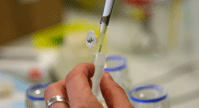Von Willebrand's Disease Type I
Description:
 Von Willebrand disease (vWD) is an inherited bleeding disorder that inhibits the normal blood clotting process, causing prolonged bleeding after an injury. People with this condition often experience excessive bruising, prolonged nosebleeds, and excessive bleeding following any form of trauma, including surgery, or dental work.
Von Willebrand disease (vWD) is an inherited bleeding disorder that inhibits the normal blood clotting process, causing prolonged bleeding after an injury. People with this condition often experience excessive bruising, prolonged nosebleeds, and excessive bleeding following any form of trauma, including surgery, or dental work.
The primary function of von Willebrand factor (vWF) a blood glycoprotein, is to bind itself to other proteins. The deficiency or failure of vWF function inhibits the blood coagulation process and causes bleeding. This is most apparent in tissues having high blood flow or narrow vessels.
Von Willebrand's disease type I (vWDI):
There have been three separate types of vWD have been identified in dogs (and people). Of these three types there are five different genetic mutations causing vWDs in dogs. Genetic tests have been developed to identify all five variants. Von Willebrand's disease type I (VWDI) is transmitted as an autosomal recessive trait with variable penetrance and is the least serious of the three.
The causal mutation for VWDI is a G>A nucleotide substitution. The mutation reduces the normal production of von Willebrand's factor (vWf) in affected dogs to only 5-10% of normal vWf production. This low concentration of normal vWf prevents normal blood coagulation resulting in excessive bleeding.
Symptoms include: Abnormal Bleeding, Abnormal Blood Clotting, Bleeding Gums, Blood In The Feces, Blood In The Urine, Easy Bruising, Excessive Bleeding, Hematochezia, Hematoma, Hematuria, Nosebleeds, Vaginal Bleeding.
Acceptable Sample Types:
Animal Genetics accepts buccal swab, blood, and dewclaw samples for testing. Sample collection kits are available and can be ordered at Canine Test Now.
This Test Is Relevant For the Following Breeds:
Animal Genetics is currently only offering testing for von Willebrand's Disease Type I, Type II, and Type III. The Type I mutation has been detected in the following breeds:
|
|
|
|
|
|
|
|
|
|
|
|
|
|
|
|
|
|
|
|
|
Results:
Animal Genetics offers DNA testing for von Willebrand's disease type 1 . The genetic test verifies the presence of the vWD mutation and presents results as one of the following:
| vWD1/vWD1 | Affected | The dog carries two copies of the mutant gene and is homozygous for the mutation associated with von Willebrand's disease type 1. The dog IS affected and will always pass a copy of the mutation to its offspring. |
| n/vWD1 | Carrier | Both the normal and mutant copies of the gene detected. Dog is a carrier for the von Willebrand's disease type 1 mutation. The dog is NOT affected but will pass on a copy of the defective gene to its offspring 50% of the time. |
| n/n | Clear | Dog tested negative for the von Willebrand's disease type 1 mutation and will not pass on the defective gene to its offspring. |
Reference:
Am J Vet Res. 2000 Feb.;61(2):115-20.
Inheritance of von Willebrand's disease in a colony of Doberman Pinschers.
Riehl J1, Okura M, Mignot E, Nishino S.
Submit a Sample for Testing:
To submit a sample for testing please go to Canine Test Now.
To
order a sample collection kit please go to order sample collection kits.
Cost per sample is $45.00 . Please see our Canine Fee Schedule for all test rates.










